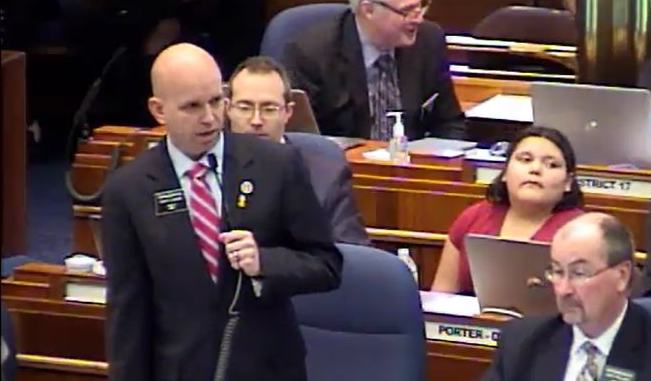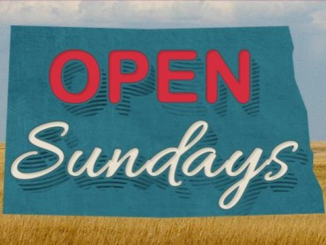
Almost a year ago, we published an article detailing a myriad of proposals that would make changes to the way North Dakota handles ballot measures. These potential changes came as a result of Senate Bill 2135 from the 2017 Legislative Session, which created the interim “Initiated and Referred Measure Study Commission“. This 18-member commission was tasked with conducting “a comprehensive study of the initiated and referred measure laws of North Dakota”.
When I wrote about the proposals from the commission a year ago, I specifically noted that Rep. Scott Louser (R – District 5) had one that seemed to be getting the most traction. At the time, I recognized the positives to Louser’s proposal, but also suggested that in its original form it was problematic for a lot of folks.
As originally written, Rep. Louser’s proposal would have required sponsoring committees for ballot measures to go through a new process. There’s a lot of pieces to the process as a whole, but the key parts of interest can be summed up as follows:
- Submit a proposal for ballot measure to a member of the Legislative Assembly.
- The legislator would then submit the proposal to Legislative Council for drafting the measure.
- Members of the sponsoring committee would then submit the measure to the Secretary of State’s office for approval.
- Once approved, petitions could then be circulated for the purpose of gathering the necessary signatures to put the measure on the ballot.
- After the required signatures were obtained and verified by the Secretary of State’s office, they would submit the measure to the Legislature.
- The measure would be assigned to a legislative committee who would hold a public hearing on it, but no amendments would be allowed.
- The legislature would then vote on the measure.
- If it failed, or was vetoed by the governor, then the Secretary of State would place the measure on the next general election ballot.
Again, that was the original proposal. But some folks had a problem with the idea of having to collect all the signatures before it would even be considered by the legislature. And in addition to that, there was no choice involved of whether to submit it to a vote of the legislature or to go straight to the ballot.
These concerns make sense when we consider the fact that some initiated measures are done in response to failures of the legislature to pass certain pieces of legislation. What sense does it make to force a sponsoring committee to go through the legislature if that body already had their say by defeating a bill on the issue at hand?
While considering Louser’s proposal a year ago, I felt the best way to strike a balance was to not only provide a sponsoring committee with access to Legislative Council, but to give them a choice between going directly to the ballot or submitting their measure to the legislature for a committee hearing and vote. And it appears this is the direction that was ultimately taken.
House Concurrent Resolution 3007 — which is sponsored by Rep. Louser — passed the House today on a vote of 77-14. According to the current language of the resolution:
“After finding a petition for an initiative measure has been signed by a sufficient number of qualified electors and meets all required criteria, the secretary of state shall ensure the measure is placed on the ballot or submitted to the legislative assembly, whichever the sponsoring committee requested.” (Emphasis Added)
Is HCR 3007 going to make everyone happy? Of course not. Proposing changes to the State Constitution in regards to ballot measures raises the ire of a lot of people. Nevertheless, I tend to think that this is a reasonable proposal. Not only will sponsoring committees be able to utilize Legislative Council in drafting their measures, but it provides them the choice of going straight to the ballot or sending it to the legislature for consideration first.
And while I fully expect opposition to this resolution, it should be far less controversial than Senate Concurrent Resolution 4001, which passed the Senate last week — on a vote of 31-16 — after it came out of committee with a unanimous Do Not Pass recommendation. That resolution proposes that the Legislative Assembly approve all initiated constitutional measures passed by the people. And if the legislature rejects them, then the measure would go back to the ballot for the people to vote all over again.
SCR 4001 crossed over to the House yesterday. HCR 3007 will now head to the Senate for consideration. Expect there to be a lot of discussion in the coming weeks on these proposed changes.
PLEASE LIKE & SHARE!
Sources:
- https://theminutemanblog.com/2018/03/22/major-changes-proposed-north-dakotas-initiative-process/
- https://www.legis.nd.gov/assembly/65-2017/bill-index/bi2135.html
- https://www.legis.nd.gov/assembly/65-2017/committees/interim/initiated-and-referred-measures-study-commission
- https://www.legis.nd.gov/assembly/65-2017/interim/19-3019-01000.pdf
- https://www.legis.nd.gov/assembly/66-2019/bill-index/bi3007.html
- https://www.legis.nd.gov/assembly/66-2019/bill-index/bi4001.html





